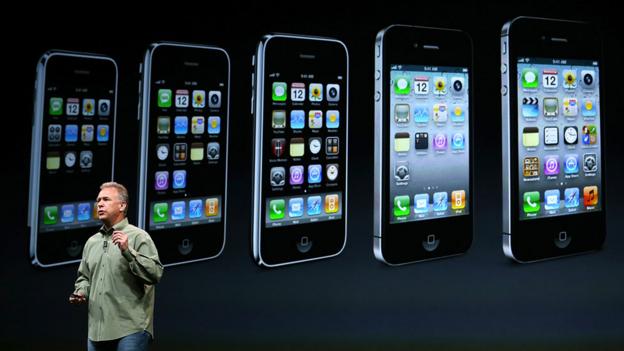
(Copyright: Getty Images)
There are few fields within which “legacy” is a dirty word, but technology is one of them, writes Tom Chatfield.
As the near-hysteria around Apple’s unveiling of its latest iPhone ably illustrated, digital culture’s hunger for the future remains as ravenous as ever.
As the announcement progressed, the technology press went into overdrive, poring over the tiniest details of the new phone. In contrast to previous launches, opinion was divided. For some, its larger screen, faster processor and fourth generation network capabilities were not the transformation that they had wanted or expected. For others, it was the perfect evolution: the promise of an ever-more instantaneous ease of usage that is the epitome of contemporary technological aspiration.
Despite the split response, analysts predict the phone will be a hit and could become the fastest selling iPhone yet.
In part, I suspect, this is because of a peculiar phenomenon that exists in the world of technology, where the concept of “legacy” has become a dirty word. Older systems and machines are at once an embarrassment and a hindrance, and servicing so-called “technical debt” is an ever-increasing burden.
It’s an attitude that comes hitched, appropriately enough, to an ever-more seamless emphasis on constant upgrading and updates . You barely need to blink before you’re up and running on the latest model. Buy a new iPhone, and all your old apps, music and books will sync onto your shiny new hardware, effortlessly shunting that antiquated iPhone 4S out of sight and mind. What’s on offer is a perpetual present: bright, fast, and constantly renewed. A new body for your phone’s soul.
The very word “upgrade” embodies an assumption of certain good – and this is often the case. Yet within this process there also lies a form of self-deception. As your digital assets are sucked from your old phone and transplanted into your new one, there is a sense that these assets are yours. Like moving a book between shelves, you are allowed to think that they are your property to do with as you please. But, as a tabloid rumour that flickered and died earlier this month showed neatly, this could not be further from the truth.
‘Constant novelty’
The story – or more accurately rumour – concerned the actor Bruce Willis, who was alleged to be considering suing Apple over his (in)ability to leave the contents of his iTunes library to his children after his death. It’s already prehistoric news in techy terms. Yet it struck a chord that continues to resonate: what exactly happens when the intractably human business of living and dying meets the weightless world of apps, data clouds and virtual assets?
Take the terms under which Facebook enables a user to sign over control of their account to someone else. The company’s statement of rights and responsibilities specifies that “you will not transfer your account... to anyone without first getting our written permission” – a hurdle likely to prove problematic for the dead.
Since 2009, Facebook has blazed one trail by allowing the profiles of users verified as deceased to be converted into permanent “memorialized accounts”. When it comes to digital media libraries, however, the legal possibilities for bequests are largely non-existent. Apple’s terms and conditions for its iCloud service are blunt, for example, stating that there is “no right of survivorship” – a delightful turn of phrase in its own right – and that “any rights to your Apple ID or Content within your Account terminate upon your death”.
Similarly – and as has been widely discussed elsewhere – music, films and ebooks purchased through companies like Amazon insist in almost every case that purchases remain associated only with the account that made the original purchase. As long as you’re alive, upgrading and paying your membership dues you’re a welcome member of the club. As soon as you stop being a part of the present, however, the entire edifice crumbles to dust.

No comments:
Post a Comment